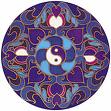18 Feb How is Transpersonal Therapy Different from Mainstream Counseling?
 People often ask me how transpersonal therapy differs from mainstream counseling. It differs in three major ways: how transpersonal therapists are trained, the context in which we hold therapy, and in some cases, the techniques we use or recommend to facilitate change.
People often ask me how transpersonal therapy differs from mainstream counseling. It differs in three major ways: how transpersonal therapists are trained, the context in which we hold therapy, and in some cases, the techniques we use or recommend to facilitate change.
Transpersonal therapists receive training in the same mainstream psychology as other therapists that is necessary to pass licensing exams. However, we are not satisfied with that as we don’t believe the modern West has all the answers, so we acquire additional training into the psychologies of other cultures: Eastern religions, Native peoples, LSD research and other altered states of consciousness, mysticism, and the esoteric aspects of all religions which Aldous Huxley dubbed “the perennial philosophy.”
This context we offer is open to spirituality and alternate ways of knowing, making the space safe for people who identify as ‘spiritual,’ i.e. those for whom spiritual search is an integral and compelling part of their life. Spiritual people are often reluctant to enter mainstream therapy with good reason, as few conventional therapists know how to honor what is outside their own mindset. Spiritual people want to be able to talk with their therapists about their experiences with altered states of consciousness, their thirst for higher knowledge and abilities. They want to be understood for wanting to be free, truly free, even if it means challenging the status quo of the mainstream culture. They want help to untangle unhelpful patterns from the past the same as other clients, but they want it from people who have gotten free themselves.
The transpersonal context is one of support for alternate ways of knowing, of understanding that a person may not want to adapt themselves to a culture that is itself sick, and that ours is not the highest state of evolution possible. It’s knowing that sometimes the greatest things humans can know come from the heart rather than the mind, that compassion may be a greater value than consumerism, that striving to reach to one’s potential is more fascinating than owning and wearing the right brands. The truly transpersonal embraces the brands too, why not? But for people who have glimpsed a reality beyond that beckons and won’t let them go, it becomes of utmost importance to remove the blocks that stand in the way of resting in the quiet space where lies the Truth of who we really are.
Techniques that transpersonal therapists utilize may include meditation, energy work, or other alternative modalities. The most important thing, however, is sound clinical skills, the ability to really ‘get’ the client, and the therapist’s commitment to their own ongoing growth.
© 2014 Catherine Auman This article is an excerpt from Catherine’s book Shortcuts to Mindfulness: 100 Ways to Personal and Spiritual Growth


Sorry, the comment form is closed at this time.